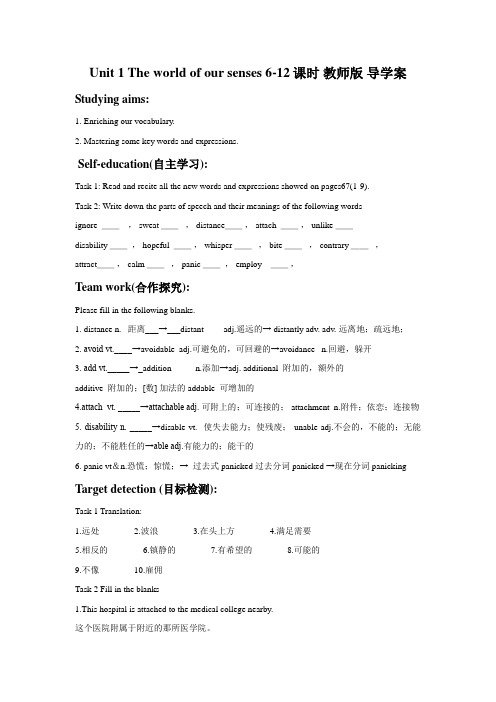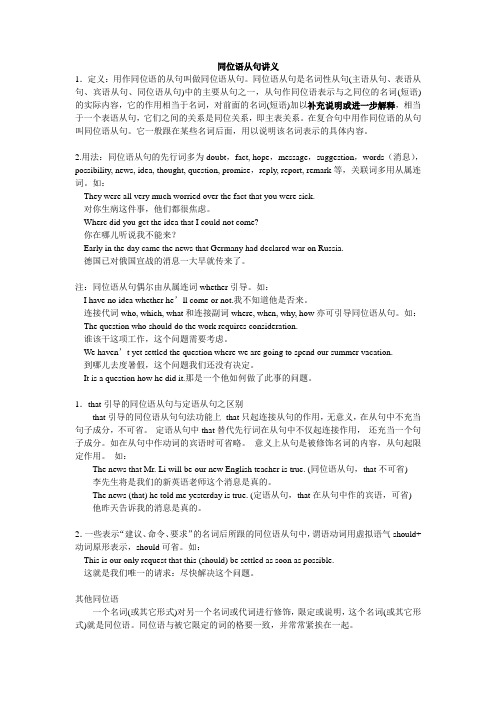apposition and appositive clause
Predicative and appositive clauses1

Predicative and appositive clausesDesigned by Xuting Teaching aims:By the end of the class, students will be able toe the correct conjunctions to introduce the predicative and appositive clauses.2.apply predicative and appositive clauses to writing.一,按要求改写成名词性从句,意思不变。
Example:The president wishes to meet the clever boy at the airport. (表语从句) —The president’s wish is that he will meet the clever boy at the airport.1. The wise man suggested our flying to Berlin tomorrow. (表语从句)2. He decided to help the poor old man as much as he could. (表语从句)3. He hopes that his father can get a well-paid job. (表语从句)Example:It is not probable that the war should break out this week. (同位语从句) —There is no probability that the war should break out this week.1.It is possible that they might do better in the project. (同位语从句)2.Bill suggested that the machine should be tested as soon as possible. (同位语从句)3.We hope that more people can join us in stopping the pollution. (同位语从句)二,填上适当的连接词。
Unit 1 The world of our senses 6-12课时 教师版 导学案-译林版必修3精品

Unit 1 The world of our senses 6-12课时教师版导学案Studying aims:1. Enriching our vocabulary.2. Mastering some key words and expressions.Self-education(自主学习):Task 1: Read and recite all the new words and expressions showed on pages67(1-9).Task 2: Write down the parts of speech and their meanings of the following wordsignore __, sweat __, distance__, attach __, unlike __disability __, hopeful __, whisper __, bite __, contrary __,attract__, calm __, panic __, employ __,Team work(合作探究):Please fill in the following blanks.1. distance n. _距离___→___distant____ adj.遥远的→ distantly adv. adv. 远离地;疏远地;2. avoid vt.____→avoidable adj.可避免的,可回避的→avoidance n.回避,躲开3. add vt._____→_addition_____ n.添加→adj. additional 附加的,额外的additive 附加的;[数] 加法的addable 可增加的4.attach vt. _____→attachable adj. 可附上的;可连接的; attachment n.附件;依恋;连接物5. disability n. _____→disable vt. 使失去能力;使残废; unable adj.不会的,不能的;无能力的;不能胜任的→able adj.有能力的;能干的6. panic vt&n.恐慌;惊慌;→过去式panicked 过去分词panicked →现在分词panicking Target detection (目标检测):Task 1 Translation:1.远处________2.波浪________3.在头上方________4.满足需要________5.相反的________6.镇静的________7.有希望的________8.可能的________9.不像________10.雇佣________Task 2 Fill in the blanks1.This hospital is attached to the medical college nearby.这个医院附属于附近的那所医学院。
appositive clause

Sentence Examples
1: There was no doubt that he was a fine scholar. 2: We received a message that he would be absent. 3: He came to see her in the belief that he will be welcome. 4: I give my guarantee that he will support the idea. 5: I’ve come to the conclusion that it won’t be wise to do I’ won’ so. 6: The news got about that he had won a car in the lottery. 7: You have no idea why she left. 8: There is some doubt whether John will come on time.
Usage
可以跟同位语从句的名词(先行词)通常有news,idea, 可以跟同位语从句的名词(先行词)通常有news,idea, fact,promise,question,doubt,thought,hope, fact,promise,question,doubt,thought,hope, message,suggestion,words(消息), message,suggestion,words(消息),possibility等。 ),possibility等 that,whether, 英语中中引导同位语从句的词通有连词 that,whether, where等 连接副词 how, when, where等。 if, which 不能引导同位语从句 同位语从句前的名词通常用单数形式 引导同位语从句的that不能省略 主语从句that不能省略 不能省略, 引导同位语从句的that不能省略 (主语从句that不能省略, 宾语从句和表语从句可以省略) 宾语从句和表语从句可以省略) 在某些名词( resolution等 在某些名词(如demand, wish, suggestion, resolution等)后 面的同位语从句要用虚拟语气 。来自Other Usage
08级本科翻译——句子翻译

三、 Appositive clauses:同位语从句
1. Apposition, a state of affairs in grammar in which one simple sentence contains two or more noun phrases that describe the same person or thing and are used in the same way, appears more frequently in English than in Chinese. The following methods are usually used to translate appositive clauses. Keeping to the original order: 1. He expressed the hope that he would come over to visit China again. 他表示希望能再来中国访问。 2. We are not investigating the question whether he is trustworthy. 我们不是在调查他是否可以信任的问题。 3. She had no idea why she thought of him suddenly. 她不明白自己为什么突然想到了他。
英汉句子翻译
一、Objective Clauses:宾语从句
Generally speaking, there is no need to change the position of the object clause in translation. However, in some cases, when “it” functions as the formal object of a complex sentence, or sometimes, preceded by a preposition, a change of order is necessary. 1.I understand that he is well qualified, but I feel that he needs more experience. 我知道他完全够条件,但我觉得他需要更多的经验。 2. I take it for granted that you will come and talk the matter over with him. 我理所当然的认为, 你会来跟他谈这件事的。 3. I regard it as an honor that I am chosen to attend the meeting. 我被选参加会议, 感到十分荣幸。
The Comparison of Attributive Clause and Appositive Clause

不同点
引导词的选择
从句意义完整用_____; that 其他按 照意思判断
Circle out the antecedent Tell which clause the sentence contains
1. The fact _____ that she works hard is well known to us all.
Appositive clause
2. The fact ____________ that/ which/ “/”she had to accept was unbelievable.
Attributive clause Attributive clause
3. The man ______ who is walking on the playground is my old friend.
4. The question _____ who will take his place is still not clear.
Appositive clause
同位语从句 相同点
定语从句
都有_______ 先行词(antecedent) 先行词在从句中______ 不充当 成分 先行词在从句中必充当 _____ 成分 主、宾、状语等 what ,_____ how 不能引导 _____ 定语从句 根据先行词在从句中 作何成分 。 _________ (充当/不充当) if ,_____ which 不能引导同位语 ____ 从句
不同点
引导词的选择
从句意义完整用_____; that 其他按 照意思判断
The news ______________ that/ which/ “/” he reported was true. Attributive clause Attributive clause ? Appositive clause?
Appositive clause

同位语从句讲义1.定义:用作同位语的从句叫做同位语从句。
同位语从句是名词性从句(主语从句、表语从句、宾语从句、同位语从句)中的主要从句之一,从句作同位语表示与之同位的名词(短语)的实际内容,它的作用相当于名词,对前面的名词(短语)加以补充说明或进一步解释,相当于一个表语从句,它们之间的关系是同位关系,即主表关系。
在复合句中用作同位语的从句叫同位语从句。
它一般跟在某些名词后面,用以说明该名词表示的具体内容。
2.用法:同位语从句的先行词多为doubt,fact, hope,message,suggestion,words(消息),possibility, news, idea, thought, question, promise,reply, report, remark等,关联词多用从属连词。
如:They were all very much worried over the fact that you were sick.对你生病这件事,他们都很焦虑。
Where did you get the idea that I could not come?你在哪儿听说我不能来?Early in the day came the news that Germany had declared war on Russia.德国已对俄国宣战的消息一大早就传来了。
注:同位语从句偶尔由从属连词whether引导。
如:I have no idea whether he’ll come or not.我不知道他是否来。
连接代词who, which, what和连接副词where, when, why, how亦可引导同位语从句。
如:The question who should do the work requires consideration.谁该干这项工作,这个问题需要考虑。
We haven’t yet settled the question where we are going to spend our summer vacation.到哪儿去度暑假,这个问题我们还没有决定。
综英语法Appositive clauses and Comparison

e.g. The fact [that he had not said anything] surprised everybody。( Appositive clauses ) Those [who work hard] will succeed。( Attributive clauses )(here “those” is a pronoun)
名词作同位语
1. Our word tobacco comes from the Spanish word tobaco, a word which means “cigar” in the Arawak Indian language.
Here, “a word” was repeated for the sake of clarity and emphasis. which引导的定语从句修饰 先行词“a word”, “a word which means nguage”是 “the Spanish word tobaco” 的同位语。
3.同位语从句先行词不同
定语从句的先行词是名词或代词;而同位语从句的先行 词只能是名词,而且仅限于idea,plan,fact,theory, promise,hope,news,doubt,truth,information, suggestion,question, thought,belief,conclusion等 少数名词。
Tips: that 既可引导同位语从句又可引导定语从句, 其区别在于: 1.同位语从句由连接词that引导,连接词that本身无意 义,在同位语从句中不充当任何成分,不可省略,不 可以用其他词替代;
2.定语从句由关系代词that引导,关系代词that在从句 中充当一定的成分,作宾语时可省略.
精选-The difference between the attributive clause and the appositive clause定语从句与同位语从句的区

定语从句与同位语从句的区别适用学科高中英语学生姓名教学目标通过学习掌握定语从句与同位语从句的区别,以利于阅读材料的理解和灵活表达自己感情或思想。
学习重点定语从句与同位语从句的判断,引导词的选择的不同学习难点被修饰词与从句的关系的判断知识点1:定语从句概念:句子充当定语,修饰限定某个名词或代词,整个从句的作用相当于形容词,所以定语从句也可称为形容词性从句,翻译为“………的”。
如:She has told me everything that you told her.词句中的that you told her 为定语从句,that在从句中充当宾语。
翻译为:“你告诉他的”,结合主句,整个复合句翻译为:她已经告诉了我你告诉她的一切。
知识点2:同位语从句概念:用句子充当同位语,此从句是对某个抽象有内含的名词进行解释说明,也可以说,此从句是用来陈述某个名词的内容。
如:I have known the fact that you failed in the exam.词句中的that you failed in the exam 就是作为抽象名词fact 的具体内容。
也就是说,事实的具体内容是:你考试失败了。
注意,此句中的引导词that 不作成分,只起连接作用。
同位语从句经常用来解释说明抽象名词如:news , fact , question, truth, doubt, evidence 等。
如:You didn’t answer me the question where you were born.He came from the government with the news that they would build a bridge in the city.知识点3:定语从句与同位语从句的区别1.意义的不同同位语从句是用于说明所修饰名词的具体内容的,它与被修饰词语是可以划等号的,即被修饰词等于整个从句的内容,被修饰词在从句中补充当任何成分;而定语从句是限制所修饰名词的,它与被修饰词之间是不可以划等号的,被修饰词只是从句的一部分,即在从句中充当某种成分。
- 1、下载文档前请自行甄别文档内容的完整性,平台不提供额外的编辑、内容补充、找答案等附加服务。
- 2、"仅部分预览"的文档,不可在线预览部分如存在完整性等问题,可反馈申请退款(可完整预览的文档不适用该条件!)。
- 3、如文档侵犯您的权益,请联系客服反馈,我们会尽快为您处理(人工客服工作时间:9:00-18:30)。
• 2. "To start with I must admit that at first I harbored reservations about a mixed marriage, prejudices you might even call them..." (para.7)
prejudices
• 1. Her mother, Deborah, all along had been supportive of our relationship, and even joked about when we were...(New Horizon English, book 2, unit 3, para.5) her mother
The Apposition & Appositive Clause
The Apposition
•noun or noun phrase • used after another noun phrase which refers to the same person or thing.
The Appositive Clause
=
Deborah
• 2. "To start with I must admit that at first I harbored reservations about a mixed marriage, prejudices you might even call them..." (para.7)
• noun clause introduced by that (fact, idea, news, etc.) • used for further explanation of the specific content of the term (noun)
The Appositive Clause
other forms
• on conditon that • on the grounds • with the expectation • in spite of the fact •...
Exercises
• please find some appositions or appositive clauses in this text
• noun clause introduced by 'that' (fact, idea, news, etc.) • used for further explanation of the specific content of the term (noun)
• 1. Her mother, Deborah, all along had been supportive of our relationship, and even joked about when we were...(New Horizon English, book 2, unit 3, para.5)
• 3. That point was emphasized by the fact that Gail's parents, after thirty-five years of marriage were going through a bitter and painful divorceeservations
• 3. That point was emphasized by the fact that Gail's parents, after thirty-five years of marriage were going through a bitter and painful divorce... (para.4)
Thank you for your attention
